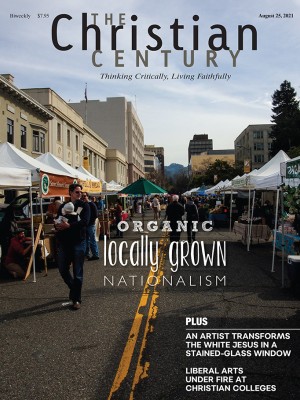September 5, Ordinary 23B (James 2:1–17)
Proclaiming God’s abundance or dwelling in perceived scarcity?
A dear friend of mine always carried a camera with him. Sometimes two. These were high-quality, professional-grade devices with large, specialized lenses. Periodically he would abruptly snap a camera up to his face and take a shot of something that caught his eye.
I wondered what he saw, and I was drawn into his experience of seeing. He was looking at the world, wanting to capture its humane moments and its striking images. Because back then he was shooting on film, the cameras had no screen to preview the images, so I had to imagine what he was seeing. His trained eye saw things that mine didn’t.
Read our latest issue or browse back issues.
He would talk passionately about photographers who influenced him and how they had shaped his visual sensibilities. He spoke lovingly about working in the darkroom, dodging and burning to bring out the desired effect. I learned so much about seeing and about creativity from him.
I wonder if he carried the cameras out of wistful longing too. He had wanted to be a professional photographer, but he told me that, as a photographer, he would never be able to live with the lifestyle he had become accustomed to as a businessman. He never really talked much about what he did for his paycheck, but he wore lovely suits and drove nice cars. If he had become a photographer, he would never have been able to eat at the restaurants he did.
James says that if a rich person walks into our church, we all make a big fuss. Maybe it is just me, and maybe I have been in too many churches with very tight budgets, but I can easily imagine that if there is any chance that this rich person is going to connect with the church, church leaders are suddenly imagining how they can finally pay for the repair to that failing air handler. A rich person represents many things: opportunity, respect, status, power, wealth. And all of these can be very useful. The church has needs, after all, and imagine what we could do with . . . And look how welcoming we are! We’ve just received this person with open arms.
But James reminds us that we also ignore or scorn the poor person. We conveniently forget Proverbs 22:2—the rich and poor, indeed all of us, are made by God in God’s own image.
I wonder if the church is like my friend when it comes to money. We want to be faithful, seeing and presenting the world with Christ’s unique vision of blessing and hope. We want to focus less on developing budgets and more on developing our prayer lives. We want to proclaim God’s abundance to a hungry world—but we feel overwhelmed by scarcity. We have grown so accustomed to buildings, salaries, and ministries that we are constantly seeking more resources. James tells us that we must live out our faith with good works, and, well, it takes money to do good works.
We want to be hospitable and welcoming to the poor, but what do they have to offer us? Are they going to ask for money at the end of the service? Won’t that be uncomfortable? We want to treat everyone equally as children of God, but we need to appease those who give more to the church and let them set the agenda.
James declares that “God has chosen the poor . . . to be rich in faith and to be heirs of the kingdom.” It is easy to romanticize such passages, especially if you have a full pantry and are on your way to paying off your mortgage: “The poor are so wonderful at trusting in God, and I wish I could be more like them!” But not knowing if you have enough gas money to visit your family member in the hospital 40 miles away is nothing to romanticize. Poor people sometimes experience moments of stunning happiness, but they also experience haunting moments of desperation.
Sometimes such desperation helps Christians to see what is really important, and some of the most faithful Christians I have known have had very few possessions. They have also been willing to drop whatever they are doing professionally and lend a hand. If time is money, then lending a hand is an opportunity cost. If time is a gift, it is a blessing to share.
I do appreciate a beautiful sanctuary. I am grateful for being able to walk in, instantly feel I am in a sacred space, and suddenly dare to hope that my life could be filled with God’s peace. I realize that these come at a price, that it takes money to create and maintain a place of wonder and hope. But the price may not be only financial. The price we pay may also involve a clouding of vision or the inability to focus our lens properly. To continue the camera metaphor, perhaps the price is having an autofocus that chooses to clarify the wrong things.
What do churches actually focus on? How much of our stewardship of God’s blessings is focused on stewardship campaigns? How often does our longing for financial security distract us from seeing God at work in our midst?
Sometimes I feel like we are carrying around God’s Word wistfully, the way my friend carried his cameras, wanting to be involved in God’s handiwork all around us, occasionally snapping a picture, but far too attached to our lifestyle.






